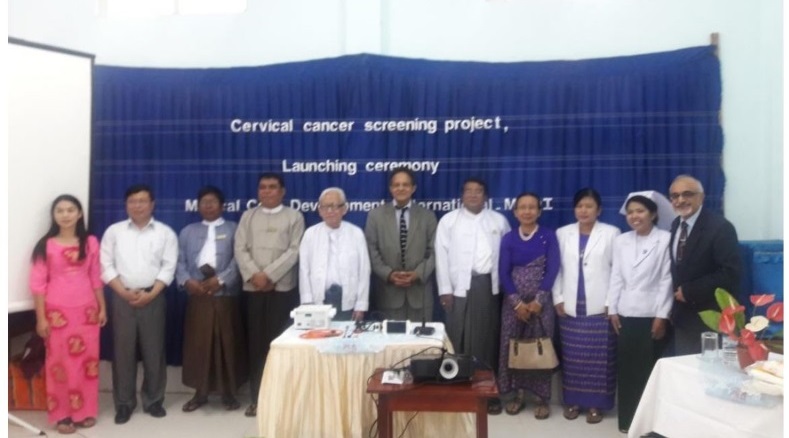MCDI Launches Maternal, Neonatal and Child Health Pilot Project in Myanmar
June 17, 2016

MCDI Staff and project stakeholders pose for photo during launch of Maternal and Child Health Pilot Project in Myanmar.
Cervical cancer is the most common cancer in Myanmar among women aged 15 to 44, which ranks 18th globally with a mortality rate of 15 out of 100,000.1 Moreover, the country has historically been a regional epicenter of resistance spreading to vital anti-malarial drugs, and currently records the second-most malaria deaths of any country in Southeast Asia. Malaria is the fourth leading cause of death in children under-five, accounting for 7.6% of deaths.2
On Friday, June 10th, Medical Care Development International (MCDI) launched a pilot project in Myanmar that focuses on the improvement of maternal, neonatal and child health in Yatsauk Township, Shan State. The project seeks to directly address two primary contributors to the target population's overall health status - malaria and cervical cancer - and the first phase of project implementation is expected to benefit over 10,000 women of reproductive age.
The Myanmar Pilot Project was first envisioned by MCDI and domestic parent company Medical Care Development as a path to improving the lives of vulnerable populations, particularly women and children. This project aims to complement the efforts of the Myanmar Ministry of Health, particularly the Women and Child Health Development section, which has worked to achieve maternal and child health-related Sustainable Development Goals (SGDs), particularly SDG 3, ensuring healthy lives and promoting well-being for all, regardless of age. Interventions such as awareness-raising, early screening, diagnosis and treatment for cervical cancer can save lives.
The year-long Myanmar pilot project, opened by the State Health Director, launched in collaboration with key local stakeholders, including Shan State and Yatsauk Township health officials, local government representatives and community dignitaries. Also present for the launch was MCDI's Country Representative, Dr. Tun-Lin, Senior Health Program Officer, Dr. Farshid Meidany, and Business Development Strategic Advisor Joseph Carter. MCDI's Cervical Cancer Screening Program Consultant and President of the Obstetrics and Gynecology Society at the Myanmar Medical Association, Professor Mya Thida, provided a presentation on the benefits of cold coagulation as a treatment method targeting abnormal cervical cells discovered during a cervical cancer screening.
The launch marked the start of the first phase of project activities, which includes the distribution of 3,000 long-lasting insecticide-treated nets (LLINs) to mothers through antenatal service providers in collaboration with Yatsauk Township Health Department, and the procurement of cold coagulations for cervical cancer screening for the General Hospital in Taunggyi, the capital of Shan State. The pilot is being funded by MCD; Vestergaard has partnered with MCDI to provide LLINs for the project.
Dr. Christopher Schwabe, MCDI's new International Health Director, commended the launch of the project and reiterated MCDI's commitment to collaboration with the Myanmar government.
"I am so very pleased with the progress that you have made to tackle these diseases already, and greatly appreciate the enormous effort that has been undertaken to make this partnership a reality by all involved, particularly by Dr. Tun Lin and Professor Mya Thida. May this be the beginning of a long and impactful engagement in Myanmar," Dr. Schwabe stated.
Founded nearly 40 years ago and currently implementing projects in 18 countries, MCDI works to improve the health of vulnerable populations through integrated, sustainable and locally driven interventions. Given the importance of partnerships as one of its core values, MCDI works across disciplines on a global and national level to empower individuals, communities and national health officials to instill the knowledge and practices necessary to improve the health of their population.
MCDI has decades of experience implementing maternal and child health, family planning, water, sanitation and hygiene, malaria control, HIV/AIDS and TB programs using communitybased approaches. MCDI’s work has been funded by grants and contracts with USAID, the World Bank, the Global Fund to Fight AIDS, TB and Malaria (GFATM), the Global Sanitation Fund (GSF), the African Development Bank, private foundations, commercial companies and other sources.
1 Data derived from official reports by WHO, United Nations, The World Bank, IARC Globocan)
www.who.int/hpvcentre/statistics/en/
2 Ministry of National Planning and Economic Development and UNICEF. Situation Analysis of Children in Myanmar. Nay Pyi Taw 2012. Available at: www.unicef.org/eapro/Myanmar_Situation_Analysis.pdf